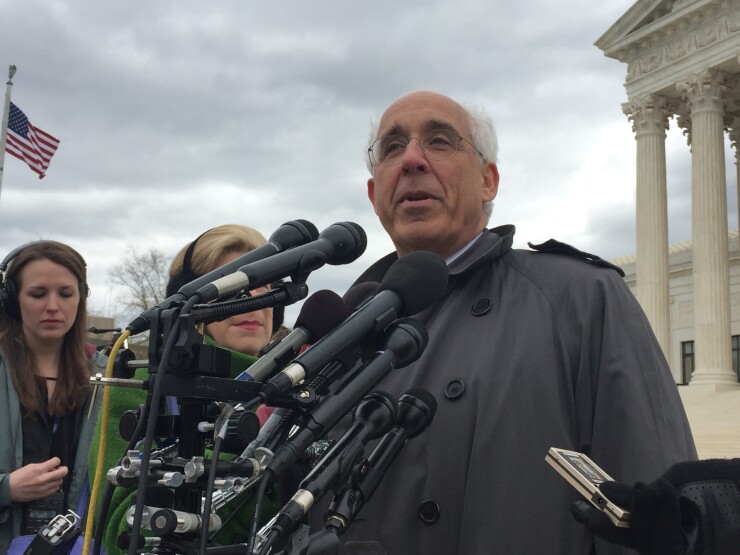WASHINGTON – Supreme Court justices on Tuesday wrestled with the problem of finding a benchmark for requiring e-commerce retailers to collect sales taxes from online purchases if they abandon an earlier ruling that said the business must have a physical presence in the state.
The justices and attorneys on both sides of a case involving South Dakota all appeared to prefer that Congress take action to regulate this area of interstate commerce that has been forced on the high court by legislative gridlock.

South Dakota Attorney General Marty Jackley told the justices that states “are losing massive sales tax revenue” and “our small businesses on Main Street are being harmed because of the unlevel playing field” that has resulted from their inability to collect sales taxes from Internet sales.
South Dakota, which has no state income tax, is appealing a state court ruling in favor of e-commerce retailers Wayfair, Overstock and Newegg. The state court invalidated a 2016 state law requiring e-commerce retailers to collect sales tax on behalf of the state if they had more than 200 transactions annually or $100,000 in sales.
The high court is being asked to overturn its 1992 ruling in Quill Corp. v. North Dakota, which upheld earlier rulings that were made in regard to purchases from out-of-state catalogue retailers before the Internet marketplace existed.
During Tuesday’s oral arguments the justices, who are widely expected to overturn Quill around the end of the court’s term in June, wrestled with the problem of finding a replacement.
“I'm concerned about the many unanswered questions that overturning precedents will create a massive amount of lawsuits about,” said Justice Sonia Sotomayor. She wondered whether one sale by an e-commerce retailer would be enough to determine a presence.
“I think that gives you a nexus,” Jackley responded.

George Isaacson, the attorney representing the e-commerce sites of Wayfair, Overstock and Newegg, asked the justices to keep the current standard and defer to Congress by allowing it to regulate Internet sales.
Isaacson cited a published comment from an official of the National Conference of State Legislatures that said if the court overturns Quill there will be no reason for states to seek congressional action.
Justice Elena Kagan pointed out that Congress has had time to act. “This is a very prominent issue which Congress has been aware of for a very long time and has chosen not to do something about,” she said. “And that seems to make the -- your bar -- higher to surmount, [doesn't] it?”
“Sometimes the activity of this court will spur Congress to act,” Jackley said, citing a Microsoft case the court dismissed earlier the same morning because the issue was resolved with newly-enacted congressional legislation.
If the court overturns Quill, the justices would be unable to prevent states from seeking uncollected sales tax on a retroactive basis, Isaacson said, but Congress could enact legislation that would only be prospective.
Deputy Solicitor General Malcolm Stewart, who argued on behalf of the United States in support of South Dakota, also said overturning Quill would be retroactive because that earlier case did not address the issue of Internet sales.
However, 38 states already have said their laws prevent them from trying to collect sales tax retroactively, Jackley said. “What is at issue is not an assessment but a collection,” he said.
Stewart said that overturning Quill would allow states to experiment on how to collect e-commerce sales taxes and Congress could afterward decide the best way to regulate it.
He also acknowledged, “It’s true Congress has the ability to craft a solution in ways that you cannot” that would be “more nuanced.”
Jackley stressed that Congress already has had 26 years since the Quill ruling to act.
Justice Stephen Breyer pointed out that a friend-of-the-court brief filed by Rep. Bob Goodlatte, R-Va., and three senators said Congress is about to act on the issue.
“There are incentives on both sides,” agreed Justice Samuel Alito, citing the option of Congress acting through legislation.
Jackley said that until Congress does act, Quill will be the default standard. He pointed out that Wayfair, one of the e-retailers involved the case, already collects sales taxes in 22 states.
Why is the Supreme Court being asked to rule “if it’s a problem that is diminishing rather than increasing?” Chief Justice John Roberts asked.
E-commerce is expanding and the current arrangement could result in $100 billion in uncollected sales tax over the next 10 years, Jackley responded.
South Dakota, Florida, Nevada, Texas, Washington and Tennessee are the six states with the most at stake in Tuesday’s Supreme Court oral arguments the Supreme Court case involving e-commerce sales tax, according to a report issued Monday by Fitch Ratings.
That’s because their sales taxes accounted for more than half of their tax revenues in 2015, Fitch said in the report.
Overall there are 20 states where at least one third of their revenue is derived from sales taxes, said the report, highlighting how the expected June ruling has bigger stakes in some statehouses than in others.
A ruling in favor of the states “could gradually improve long-term revenue growth prospects,” Fitch said.





